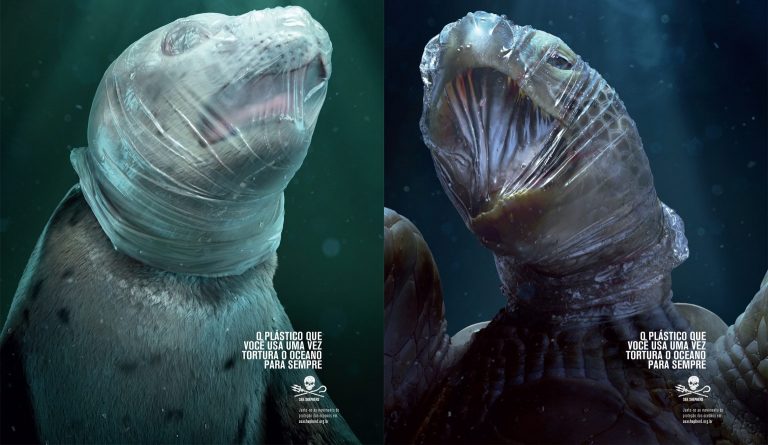(Português) Nova campanha da Sea Shepherd mostra animais que sofrem com a contaminação plástica dos oceanos
ORIGINAL LANGUAGES, 11 Mar 2019
David Arioch | Vegazeta – TRANSCEND Media Service
“Se os oceanos morrerem, nós também morreremos”, alerta Paul Watson.

Segundo a campanha, um simples saco plástico pode representar o sofrimento extremo e até a morte de milhares de animais.
9 mar 2019 – Em sua nova campanha, a organização de conservação da vida marinha Sea Shepherd mostra que um simples saco plástico, que parece inofensivo aos nossos olhos, pode representar o sofrimento extremo e até a morte de milhares de animais que habitam os oceanos.
Criada em parceria com as equipes Tribal Worldwide São Paulo e DBB Guatemala, a campanha diz que “o plástico que você usa uma vez tortura o oceano para sempre”. A campanha conta com produção em 3D do Notan Studio.
No novo trabalho de conscientização e sensibilização da Sea Shepherd, animais marinhos como focas e tartarugas são apresentados em situações de agonia e impotência ao entrarem em contato com elementos plásticos comuns no cotidiano e descartados sem os devidos cuidados.
Segundo o fundador e presidente da Sea Shepherd, Paul Watson, cientistas já alertaram que em 2050 haverá mais plásticos nos oceanos do que peixes no mar. “A Shepherd está comprometida em desfazer esse cenário negativo porque se os oceanos morrerem, nós também morreremos”, alerta Watson.
_____________________________________________
 David Arioch é jornalista profissional, historiador e especialista em jornalismo cultural, histórico e literário.
David Arioch é jornalista profissional, historiador e especialista em jornalismo cultural, histórico e literário.
Go to Original – vegazeta.com.br
DISCLAIMER: The statements, views and opinions expressed in pieces republished here are solely those of the authors and do not necessarily represent those of TMS. In accordance with title 17 U.S.C. section 107, this material is distributed without profit to those who have expressed a prior interest in receiving the included information for research and educational purposes. TMS has no affiliation whatsoever with the originator of this article nor is TMS endorsed or sponsored by the originator. “GO TO ORIGINAL” links are provided as a convenience to our readers and allow for verification of authenticity. However, as originating pages are often updated by their originating host sites, the versions posted may not match the versions our readers view when clicking the “GO TO ORIGINAL” links. This site contains copyrighted material the use of which has not always been specifically authorized by the copyright owner. We are making such material available in our efforts to advance understanding of environmental, political, human rights, economic, democracy, scientific, and social justice issues, etc. We believe this constitutes a ‘fair use’ of any such copyrighted material as provided for in section 107 of the US Copyright Law. In accordance with Title 17 U.S.C. Section 107, the material on this site is distributed without profit to those who have expressed a prior interest in receiving the included information for research and educational purposes. For more information go to: http://www.law.cornell.edu/uscode/17/107.shtml. If you wish to use copyrighted material from this site for purposes of your own that go beyond ‘fair use’, you must obtain permission from the copyright owner.
Read more
Click here to go to the current weekly digest or pick another article:
ORIGINAL LANGUAGES: